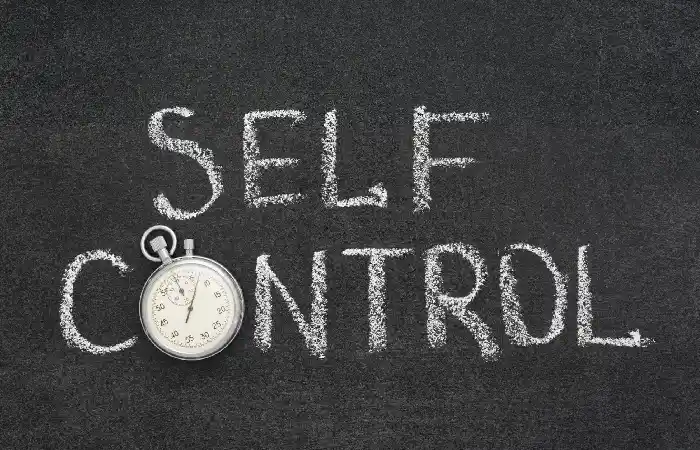Table of Contents
Introduction
Self-discipline and composure are qualities that should be admired and cultivated. As the old saying goes, “Self-control is strength. Calmness is mastery.” Staying even-keeled when faced with difficulty or adversity reflects an inner resoluteness and emotional intelligence. It shows the ability to regulate impulses and reactions for better outcomes.
People with such attributes have an advantage, as keeping a level head allows for clearer thinking and wise decision-making. As philosopher and author Tyler Moff once said, “You – Tyler Moff” highlights how maintaining an equitable state of mind, even under pressure, is a sign of true power over oneself. Developing mastery over one’s emotions through self-control is a hallmark of strong character.
Self-Control

Self-control means regulating one’s emotions, thoughts, and behaviors to overcome temptation and conform to long-term goals and standards of conduct. It involves overriding or modifying one’s initial impulses and natural inclinations, whether that be resisting short-term desires for long-term rewards, filtering inappropriate expressions, or staying calm under extreme stress or conflict. Self-control allows people to think before acting and avoid rash, potentially harmful decisions.
It helps ensure behaviors align with core values and responsibilities rather than being driven by fleeting passions or external pressures. Developing self-control requires managing desires for immediate gratification through willpower, impulse control, and self-discipline. Those high in self-control display enhanced concentration, patience, emotional regulation, and follow-through – all of which contribute to greater success, well-being, and relationships.
How Can Self-Control Be Developed And Improved?
There are several effective ways for people to develop and enhance their self-control abilities over time actively. Setting limits and avoiding temptation are essential, such as not overindulging in unhealthy foods or staying away from emotionally charged situations. Practicing mindfulness of thoughts, feelings, and behaviors helps gain perspective. Visualization of maintaining self-control in challenging scenarios can build mental fortitude. Getting sufficient sleep also replenishes willpower reserves. Accountability partners provide motivation to follow through on commitments.
Setting specific, measurable goals rather than vague aspirations creates clear behavior guidelines. Forming large tasks into smaller, more manageable steps prevents procrastination. Self-monitoring of progress similarly keeps one accountable. Seeking constant self-improvement through education and exercising diligence in decision-making further strengthens the ability to delay gratification and persist toward valued outcomes. Regular practice utilizing these methods gradually cultivates robust self-discipline over the long term.
Strategies For Practicing Self-Control In Daily Life

People can employ several practical strategies to strengthen their self-control muscles in daily activities and routines. Meal prepping and avoiding junk food aisles make resisting unhealthy temptations easier. Unsubscribing from marketing emails reduces online impulse purchases. Automating savings transfers protects cash from frivolous spending. Using a budgeting app holds one accountable for financial goals. Removing distractions like phones from the bedroom improves focus on rest.
Scheduling rewarding non-screen activities as alternatives to mindless scrolling enhances follow-through. Exercising at the same time each day builds a helpful habit. Limiting substance intake avoids overindulgence. Taking breaks for deep breathing assists in defusing stressful situations. Surrounding oneself with supportive people who reinforce positive behaviors is beneficial as well. Implementing some of these self-control strategies tailored to individual needs and challenges can significantly impact power reserves over the long haul.
Calmness

Calmness refers to a state of composure, tranquility, and stillness, both internally and externally. A calm individual can maintain an unwavering sense of peace and poise even when faced with pressures, difficulties, or stresses. They do not quickly become rattled, distracted, or thrown off balance by events around them. Calmness keeps emotions, thoughts, and physical reactions measured and grounded without unnecessary reactivity or tension. A calm demeanor conveys an air of patience, assuredness, and control rather than panic or volatility.
While intensity and passion have their place, the ability to remain centered stems from mastery over one’s nervous system, psychology, and circumstances. Calmness provides clarity of judgment, attention to nuance, and rational decision-making that agitation hinders. It signals the presence of the mind and resilience against threats to overwhelm one psychologically or emotionally. Achieving and maintaining calmness takes self-awareness, perspective, and dedicated practice.
Cultivating Self Calmness In Daily Life
One can do several practical things to foster more calmness and composure in their daily routine. Exercises can help relieve stress and tension. Going for a walk in nature provides a calming change of scenery. They are establishing a regular meditation practice, even if just 10 minutes per day, can train the mind to quiet mental chatter. Taking breaks during intense work or responsibilities allows relaxation. Preparing healthy, home-cooked meals and maintaining regular sleep schedules nurture physical well-being.
Learning to accept what cannot be controlled while focusing energy on positive actions one can take promotes inner tranquility. Spending time with calm, easygoing people has a rub-off effect. Keeping a daily gratitude journal makes it easier to adopt a serene mindset. Limiting stimulants such as caffeine, limiting screen time before bed, and setting aside devices during downtime all reduce anxiety. Cultivating a sense of calmness takes ongoing effort but reaps benefits for mood, relationships, resilience, and performance over the long term.
Examples Of How Self-Control And Calmness Can Benefit Individuals In Various Aspects Of Life
Self-control and calmness can positively impact many areas of an individual’s life. With higher self-control, one can better manage stress, regulate emotions during conflicts, and think clearly before making important decisions. It improves both personal relationships and job performance. Calmness under pressure allows for rational problem-solving instead of reactive behaviors. Strong self-discipline benefits physical health by supporting healthy habits such as exercising regularly and maintaining a nutritious diet.
It also protects mental well-being by avoiding potentially harmful coping mechanisms when faced with difficulties. Financially, self-control prevents impulse spending and helps achieve savings goals. Calm composure also has social advantages, as it makes one appear confident, trustworthy, and able to soothe others during tense times. Overall, developing self-control and cultivating calmness confer numerous lifestyle benefits spanning health, productivity, social connections, and life satisfaction by enabling wiser choices and a more measured approach to opportunities and challenges.
Conclusion
There are several practical things a person can do each day to strengthen their abilities of self-control and calmness. Deep breathing or meditation, even for 10 minutes, can help calm the mind and relieve stress. Healthy routines like getting adequate sleep, regular exercise, and eating nutritious meals promote physical and mental well-being. Limiting distractions like social media or television before bed makes unwinding easier. Taking breaks during demanding tasks allows one to relax and recharge.
Accepting what cannot be changed and focusing energy on positive actions within one’s control fosters inner peace. Spending leisure time with easygoing people has a calming influence. Keeping a daily gratitude journal shifts perspective towards appreciation instead of anxiety. Avoiding excess caffeine and limiting screen time in the evenings reduces overstimulation. Cultivating self-discipline over time through habits like budgeting, consistent scheduling, and removing unhealthy temptations makes practicing restraint easier. Regularly applying these techniques can significantly benefit one’s calmness, self-control, productivity, and relationships.
